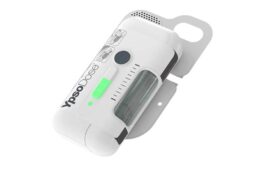 The in vitro diagnostics company Biomerica has a diversified portfolio, including tests for lab, point-of-care and at-home settings. The company has a particular focus on addressing the treatment of gastrointestinal and inflammatory diseases.
The in vitro diagnostics company Biomerica has a diversified portfolio, including tests for lab, point-of-care and at-home settings. The company has a particular focus on addressing the treatment of gastrointestinal and inflammatory diseases.
We recently spoke with Hamburg, Germany–based Astrid Starke, Biomerica’s marketing director, to learn more about her experience in the life sciences industry. Starting off as a Ph.D. researcher at the University of Zurich, Stark has held positions related to organ transplantation, allergy diagnostics and laboratory diagnostics. In this interview, she discusses topics such as gender equity in the workplace, the importance of clear communication in the workplace and mentorship programs for women.
The responses have been lightly edited.
What are the main focus areas of Biomerica’s product portfolio?

Astrid Starke
Astrid Starke: Biomerica is a biomedical company specializing in the development of in vitro diagnostics across a wide range of products. Our main focus is on developing diagnostic products. Our portfolio includes tests for lab, point-of-care and at-home settings. A central focus of Biomerica is developing over-the-counter at-home screening tests for breast cancer, colorectal cancer and prostate cancer. Also, we’re close to launching an in vitro diagnostic to help patients with irritable bowel syndrome (IBS).
Many people with IBS know that food can trigger their symptoms, but they may not be sure which foods to eliminate from their diets. They often try different diets with no clear outcome. Our task is to help patients identify these trigger foods. The panel we have developed is specific for IBS patients and not for any other medical condition. We have identified specific foods that can trigger symptoms for IBS patients, and based on positive results, patients can start by eliminating one or two foods from the list of 100 foods provided by other assays. This is a significant difference and we hope it will have a positive impact on patients’ quality of life. In our preclinical studies, we have seen that elimination diets can lead to better symptoms for patients. This is the company’s primary focus for the next year and beyond.
How did you end up at Biomerica?
Starke: A colleague of mine approached me regarding a marketing director position at Biomerica. I had worked with the company before and when I looked at their product portfolio, I recognized many familiar products and also saw many new products, which I thought was a good combination. I saw this as an opportunity for my next career step, so I decided to join Biomerica. The process was quite simple.
I live in Germany, where I also started my education. I hold a master’s degree in human biology. My main areas of interest are immunology and physiology. I earned my Ph.D. in immunology at the University of Zurich, where I worked for the university clinics’ quality department. This enabled me to have direct contact with patients and to work closely with the physicians treating them. My research was patient-focused. We really looked at the patients’ needs. During my time working in the hospital, I also served as a clinical trial manager for transplantation patients. That experience was particularly interesting to me. I saw firsthand how a transplant could transform a patient’s life from being on dialysis to having a better quality of life.
Could you say more about your educational background?
Starke: After completing my PhD and working in clinical trial management, I made the decision to transition into the diagnostic industry. I started working for a small bio startup company that developed new biomarkers to help transplantation patients adjust their immunosuppressive drugs. This was an exciting opportunity for me because I had previous experience with transplantation, and I was able to apply that experience in my new role. I was responsible for building up a key opinion leader network in Germany for our diagnostic devices. From there, I moved into product management roles for two different diagnostic companies, where I was responsible for the product life cycle of allergy diagnostics. Allergy diagnosis is a complex field that involves multiple biomarkers, and it is important for correct disease diagnosis. During this time, I also had some involvement with COVID antigen tests, which was a very competitive field for a product manager due to the number of diagnostic companies that developed COVID tests. Eventually, I landed at Biomerica as a marketing director.
Have you experienced any struggles being a woman in the life sciences industry?
Starke: In my work life, I’ve had the perception that there was generally a gender balance between men and women. Child care might be better in Germany than in other places, allowing women to work full-time, and this contributes to maintaining gender equity. However, there may be differences in gender equity across different parts of Germany. In Biomerica’s management team, there are four women and five men, indicating some level of equity.
What is your biggest leadership challenge?
Starke: My biggest challenge is working remotely from Germany while my team is based in California in the United States. There are nine hours between us. The time difference means that we have a limited window for meetings and it can be difficult to feel like a complete member of the team and also manage them effectively.
To overcome this challenge, I make sure to have regular catch-ups and am available even outside of my working hours. I encourage my team to contact me with any questions so that we can solve any issues immediately rather than waiting until the next day.
What are some lessons that have guided your career?
Starke: One lesson I’ve learned relates to clear communication. It is essential to be clear and tactful when prevent and address conflicts between team members. People need to communicate their expectations to each other. Sometimes, it’s better to have a phone call or a Teams meeting instead of trying to work things out over email. I’ve found that picking up the phone can often resolve issues that may have taken days or even weeks to resolve through written communication. This approach is especially important when working in cross-functional teams with multiple departments with varying needs.
People have private lives and struggles outside of work that can affect their performance. One strategy to support working parents, especially women, is to ensure a good childcare system is in place. Childcare can come from the city, state or country, or even from the company itself. I have worked at companies offering childcare to promote flexibility for working parents. This practice can help support a more inclusive and diverse workplace.
It’s important to give women the flexibility to work full-time or part-time. Another consideration is to support remote work or provide compensation for overtime to help balance work and life duties.
Networking systems and mentorship programs for women are another priority. Such programs can help women navigate challenges and take advantage of opportunities for career advancement. It’s important to encourage women to be courageous and take risks, to apply for new positions or take on new responsibilities. Providing mentorship and support can help them feel more confident and empowered to take the next steps in their careers.
What projects have made you love what you do?
Starke: Diagnostics are key for treating a wide variety of patients. The teamwork and these cross functional teams involved in commercializing those diagnostics is never boring. There’s interaction as a product manager and now as marketing director. There is always this interface between the customer needs, and the internal departments, which is very exciting. Sometimes of course, it can also be very stressful due to the different needs of each of the stakeholders. But I really like to be involved and to have an overview of the projects and product development. Working with patients has changed my perspective. There is the goal of doing something good for the patient.
Filed Under: Drug Discovery and Development





Tell Us What You Think!
You must be logged in to post a comment.